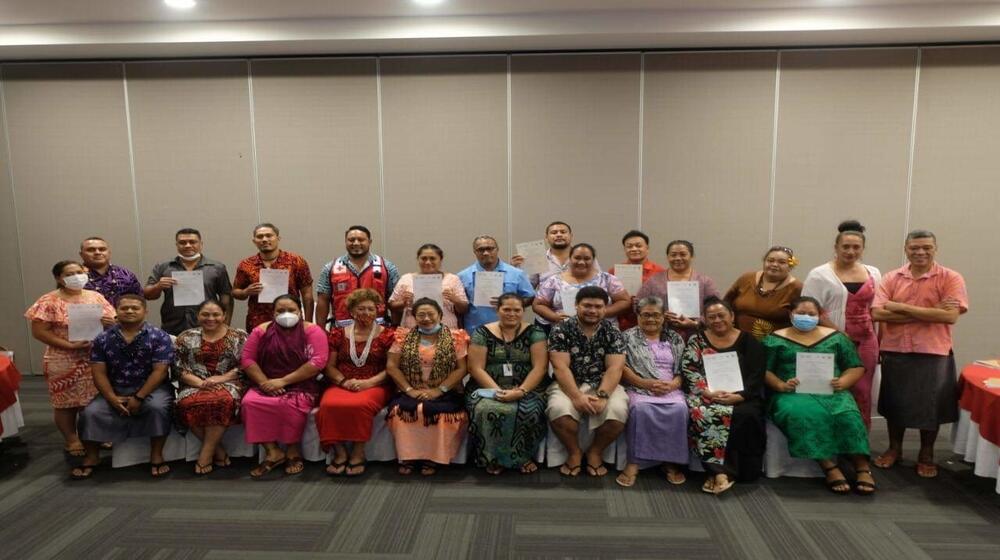In the Pacific, most young people have limited access to Family Life Education (FLE) which is critical for their development into healthy and productive adults. FLE is right-based, gender-inclusive and life skills-based, providing the full range of information, skills, and values to enable young people to make informed choices about their health and family life in a rights-based and gender-sensitive framework.
As adolescents transition through to adulthood, it is crucial that they are equipped with the necessary knowledge, attitudes, and skills to support their health and wellbeing, regardless of age, sex, marital status, socioeconomic status, ethnicity, sexual orientation, or gender identity. Age-appropriate FLE is an effective means of reaching a large population of children and young people in a school setting or out of school and community based learning.
The United Nations Population Fund (UNFPA) funded both in-school and out-school Family Life Education training which was held in Samoa. The Australian Government Transformative Agenda Programme (DFAT TA) on Unmet Need for Family Planning and the Spotlight Initiative programme provide funds to UNFPA. The UNFPA Samoa Office works closely with the Ministry of Finance in developing work plans and budgets of national implementing partners for both DFAT TA and Spotlight.
UNFPA Youth and Adolescent Technical Adviser, Brian Kironde said that UNFPA in the Pacific has been supporting countries in their efforts to develop and implement FLE programmes which aim to equip adolescents and youth with the right set of information, knowledge, and skills, and to provide safe space for exploring and nurturing positive values and attitudes towards their health in general and SHR.
The rollout of the Out-of-School (OOS) component of FLE is specifically a Spotlight Initiative activity, with the Spotlight objective to end all forms of violence against women and girls. OOS FLE teaches healthy relationships, life skills, respecting diversity, and gender norms, and falls under Pillar 3 of Spotlight on Prevention. Spotlight Initiative has six Pillars and was officially launched in March 2020 by the Government of Samoa.
The OOS FLE Master Trainer training was carried out in November 2021 and conducted by UNFPA regional partner, Family Planning New South Wales. Nine facilitators completed the initial maser training over 5 days.
Samoa Family Health Association, Member Association of IPPF coordinates the Out of School FLE project comprising of three government ministries – Ministry of Education, Sports and Culture, Ministry of Women, Community and Social Development, Ministry of Health, National Human Rights Institute, and CSOs – Samoa Education Network (METI), Faataua le Ola (FLO), Samoa Red Cross Society, Apelu Sports (Women in Sports), Samoa Faafafine Association, Nuanua o le Alofa (NOLA), Samoa Victim Support Group (SVSG), and Samoa Family Health Association.
Gatoloai Tili Afamasaga, UNFPA- FLE Coordinator said that the first FLE facilitator training was scheduled in March but was canceled last minute when they had their first COVID-19 community transmission case.
“The out-of-school FLE is curriculum-based with seven modules developed and customized to the local Samoan context. The diversity of youths in Samoa provided their feedback on the appropriateness of the curriculum modules to the Samoan context. FLE concepts are aimed to equip young people with the Knowledge, Skills, Attitudes, and Values to develop respectful social and interpersonal relationships, bodily developments as adolescents transform into adulthood and family well-being. The second-tier training is aimed to train more FLE facilitators as we strive to build up our capacity to train enough facilitators to go out to teach FLE to community-based youth,” says Gatoloai.
Participants when asked about Family Life Education most replied that there is not enough understanding or the subject is not well understood in their communities. “Youth have little understanding of FLE,” says Samoa Red Cross representative. NOLA representative said a study in 2010 on Sexual Reproductive Health for people with disabilities found not enough understanding on healthy relationships and respecting diversity. Unhealthy relationships contribute to domestic violence.
The FLE facilitators training approached understanding of FLE concepts though a Samoan lens and emphasised the use of Samoan words when going out to communities to share knowledge on FLE - ‘values’ aga tausili, and ‘faatamaliiaga’.
The 2nd tier training for FLE facilitators was held at Taumeasina Island Resort last week Thursday 12th and 13th where nine facilitators graduated. The third cohort training of youth facilitators was held last week Thursday 19th and Friday 20th where 12 participants graduated as FLE facilitators.



